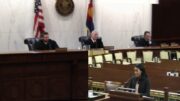By Jeffrey A. Roberts
CFOIC Executive Director
Winners of open-records lawsuits in Colorado are entitled to attorneys’ fees, even if they succeed in getting only one record released.
That’s what the Colorado Court of Appeals decided last week in Reno v. Marks, in which Chaffee County Clerk and Recorder Joyce Reno sought to keep citizen elections monitor Marilyn Marks from inspecting voted ballots from the 2010 general election.
Reno agreed to produce one anonymous ballot requested by Marks following the passage of HB 12-1036, which set guidelines for releasing voted ballots under the Colorado Open Records Act (CORA). But the district court concluded that Marks shouldn’t get attorneys’ fees because she was not a “prevailing applicant” in the court action filed by Reno.
The court of appeals reversed that decision in a 2-1 ruling on Jan. 16, sending the case back to the district court judge to determine how much Chaffee County should pay Marks.
“The court of appeals has again held, as it did in the Benefield case, that the statute is clear that any citizen who receives any records in response to a lawsuit under the Open Records Act is, by definition, a prevailing applicant, even if it is only a single record,” said media lawyer Steve Zansberg, president of the Colorado Freedom of Information Coalition.
In Colorado Republican Party v. Benefield, the court of appeals reversed a district court decision that denied the state GOP attorneys’ fees in a CORA lawsuit involving surveys sent to constituents by several Democratic state representatives. The appellate court’s ruling in that case has been argued in the Colorado Supreme Court, and a ruling from that court is expected.
Zansberg said it is also noteworthy in the Reno v. Marks decision that Marks is entitled to attorneys’ fees, even though it was Reno who filed the court action. Under CORA, records custodians do not have to pay attorneys’ fees when they ask a court to help them determine whether they are barred from releasing records, and the court makes express findings, based on the evidence, that the custodian was “unable, in good faith, after exercising reasonable diligence, and after reasonable inquiry” to determine if disclosing a public record is prohibited under the law.
Anyone filing an open-records lawsuit in Colorado must give three days’ notice in order to protect his or her right to be awarded attorneys’ fees. Records custodians sometimes deny requests and then file their own court actions within that three-day period in an effort to avoid having to pay attorneys’ fees.
“This ruling will hopefully eliminate the race to the courthouse where custodians who have denied a records request run into court during that three-day notice period seeking to avoid paying the requester’s attorneys’ fees,” Zansberg said. “This court says that (exemption) is limited to situations where the custodian has told the requester she is unable to determine whether the records are prohibited from being disclosed, not the ordinary denial situation, nor, as here, where the custodian seeks a court order authorizing her to withhold a public record.”
Follow the Colorado Freedom of Information Coalition on Twitter @CoFOIC. Like CFOIC’s Facebook page. Do you appreciate the information and resources provided by CFOIC? Please consider making a tax-deductible donation.




